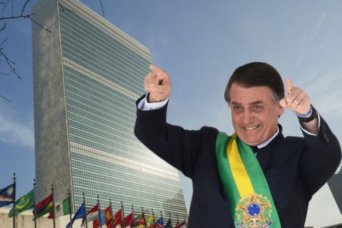- About
- Topics
- Picks
- Audio
- Story
- In-Depth
- Opinion
- News
- Donate
- Signup for our newsletterOur Editors' Best Picks.Send
Read, Debate: Engage.
| topic: | Democracy |
|---|---|
| located: | Brazil |
| editor: | Ellen Nemitz |
Brazil has had six constitutions before the current one, created in 1988, just a few years following the end of the military dictatorship in 1985. Called the “citizen constitution”, it replaced the dictatorial one and initiated a democratic era, providing important social and political principles. The nickname is also due to the basic social and individual rights assured by unchangeable clauses: article 5 says that every person is equal under the law and has the right to life, liberty, equality, safety and property.
This article unfolds into almost 80 items and one of them is the presumption of innocence, currently a point of juridical and legislative discussion as it was the base of the Supreme Court's ruling, which led to former president Luiz Inácio Lula da Silva's release. Just a few days after, the Senate leader, Davi Alcolumbre, suggested the possibility of convening a new constituent assembly.
However, this is not the first time politicians bring up the idea of changing the 1988 constitution, usually to promote political reforms. “Some years ago I gave an interview about a new constitution and I said it is an inconvenient idea, and nowadays I reaffirm this position. This is the best constitution of a republic period and, even though it reflects the conflicts of that time, there are ways to improve it other than making a new one”, says Vera Karam Chueiri, professor of constitutional law at the Federal University of Parana and director of the Law Department at the same institution, referring to amendments that can be voted by the Congress and Senate.
Professor Vera Karam calls “opportunism” the attempts to change the supreme law during a crisis such as the current political one. She is not alone: other specialists strongly disagree on the constituent assembly. Ministers of the Supreme Court, Gilmar Mendes and Luís Roberto Barroso, have said that the current constitution has strengthened the democracy and must be guarded. Congress' leader, deputy Rodrigo Maia, assesses that a new constitution would promote uncertainty.
Revoking the constitution also represents a risk to some fundamental social and labour rights, such as freedom of thought and worship and the right to access information, besides guaranteeing maximum labour journey and minimum wage, for example. In addition, later developed public policies that ensure education, health, social assistance and other services are based on this constitution. Therefore, professor Vera Karam affirms that every suggestion to change it "is a risk of making historically conquered rights vulnerable”.
Karam explains that there are many steps before the constituent assembly is held and that this should be a democratic process, but notes that she is not optimistic: “For me it sounds that the process will be arbitrary. We can call this an attempted coup against the constitution”. The way to avoid annihilation of such a well-evaluated constitution, according to her, is the mobilization of the people. “The popular reaction must be to resist and defend this constitution committed to the democratic regime”, she claims.

